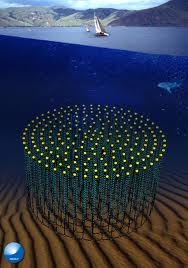KM3NeT, an European deep-sea research infrastructure, will host a neutrino telescope with a volume of at least one cubic kilometre at the bottom of the Mediterranean Sea that will open a new window on the Universe.
The telescope will search for neutrinos from distant astrophysical sources like gamma ray bursters, supernovae or colliding stars and will be a powerful tool in the search for dark matter in the Universe.
An array of thousands of optical sensors will detect the faint light in the deep sea from charged particles originating from collisions of the neutrinos and the Earth.
The facility will also house instrumentation from Earth and marine sciences for long term and on-line monitoring of the deep sea environment and the sea bottom at depth of several kilometers.




